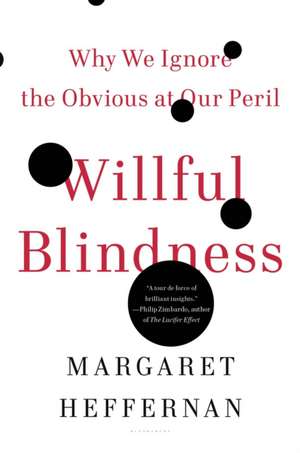Willful Blindness: Why We Ignore the Obvious at Our Peril
Autor Margaret Heffernanen Limba Engleză Paperback – 30 iun 2012
Why, after every major accident and blunder, do we look back and say, How could we have been so blind? Why do some people see what others don't? And how can we change? Drawing on studies by psychologists and neuroscientists, and from interviews with business leaders, whistleblowers, and white collar criminals, distinguished businesswoman and writer Margaret Heffernan examines the phenomenon of willful blindness, exploring the reasons that individuals and groups are blind to impending personal tragedies, corporate collapses, engineering failures-even crimes against humanity.
We turn a blind eye in order to feel safe, to avoid conflict, to reduce anxiety, and to protect prestige. But greater understanding leads to solutions, and Heffernan shows how-by challenging our biases, encouraging debate, discouraging conformity, and not backing away from difficult or complicated problems-we can be more mindful of what's going on around us and be proactive instead of reactive.
Preț: 156.44 lei
Nou
29.94€ • 30.93$ • 24.92£
Carte indisponibilă temporar
Specificații
ISBN-10: 0802777961
Pagini: 294
Dimensiuni: 142 x 210 x 24 mm
Greutate: 0.36 kg
Editura: Walker & Company
Recenzii
"MUST READ. If you don't have a New Year's resolution yet, Margaret Heffernan's The Naked Truth may help. The former CEO offers practical advice on career advancement, including how to avoid workplace stereotypes and how to overcome obstacles while holding onto personal values." "
-- New York Daily News."
"From the Hardcover edition."
"[A] riveting, important book. . . . [Heffernan] is an engaging writer able to marshal fascinating multi-disciplinary research into a narrative that traverses the quest for conformity, groupthink [and] how an overloaded mind leads to moral blindness. . . . Eye-opening."
--"Macleans
"
"A call to arms to any whistle-blowers who see what lies ahead and have the courage to speak up. . . . A sharp-eyed perspective on the ever-gathering storm."
"--Kirkus
"
"A thoughtful and entertaining treatise on the seductiveness--and consequences--of ignoring what's right in front of our eyes ... Heffernan's cogent, riveting look at how we behave at our worst encourages us to strive for our best."
--"Publishers Weekly
"
"Willful Blindness is an engaging read, packed with cautionary tales ripped from today's headlines as well as a trove of research on why we often stick our head in the sand. With deft prose and page after page of keen insights, Heffernan shows why we clos
"[An] absorbing new book about why we choose to avert our gaze from wrongdoings or flaws or sad certainties we can't bring ourselves to confront. Willful Blindness""cuts a broad swath across the fabric of our culture."
"--The Gazette"
" "
"Writing in clear, flowing prose . . . [Willful Blindness] made me think long and hard about how the pace and priorities of our daily lives can hinder our ability to live as decently and as truthfully as we can."
"--The New York Times"
"[A] riveting, important book. . . . [Heffernan] is an engaging writer able to marshal fascinating multi-disciplinary research into a narrative that traverses the quest for conformity, groupthink [and] how an overloaded mind leads to moral blindness. . . . Eye-opening."
--"Macleans
"
"A call to arms to any whistle-blowers who see what lies ahead and have the courage to speak up. . . . A sharp-eyed perspective on the ever-gathering storm."
"--Kirkus
"
"A thoughtful and entertain
"Clear, flowing prose ... The book made me think long and hard about how the pace and priorities of our daily lives can hinder our ability to live as decently and as truthfully as we can.""--New York Times
""A tour de force of brilliant insights."--Philip Zimbardo
"An engaging read, packed with cautionary tales ripped from today's headlines ... Even better, [Heffernan] points the way out of the darkness."--Daniel H. Pink, author of "Drive and A Whole New Mind"
Notă biografică
Descriere
We turn a blind eye in order to feel safe, to avoid conflict, to reduce anxiety, and to protect prestige. But greater understanding leads to solutions, and Heffernan shows how-by challenging our biases, encouraging debate, discouraging conformity, and not backing away from difficult or complicated problems-we can be more mindful of what's going on around us and be proactive instead of reactive.
